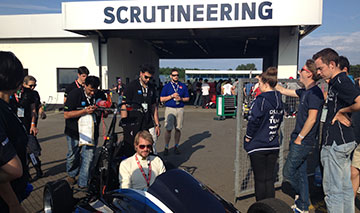How many hours per week do people need to invest in the team?
This is down to personal preference and some students are involved with other activities – however we usually ask for a minimum of 8-hours weekly. We operate on a deadline schedule where we decide when a task has to be completed by and the team member works on that deadline.
What testing can you carry out before the competition in July? Can all testing be carried out on the university site or do you need time at offsite facilities?
We will be carrying out the initial testing at our campus but that will be more on axles in the car park to test if the motors turn the wheels. When it comes to more intense dynamic testing we will need to use a proper testing facility. Right now, we are looking at the Millbrook testing facility near Milton Keynes.
Is there a tight community of teams around the UK? Do universities share information and expertise with each other?
This comes as a surprise to many as Formula Student is often compared to F1, where every team operates on secret ideas and designs, but the truth is that all FS teams are very open and willing to help other teams globally.
We have a lot of teams to thank for helping us through the years, and we are grateful to passing on the tradition of assistance to more teams.
Who drives the car?
It is stated in the rules that the drivers have to be students of the university. Our primary driver, Steve Hannon, is the 2015 champion of the Kingston University karting team. Weighing at 55kg, he weighs about the same as our battery pack!
What advice would you give to anyone wanting to get involved with Formula Student, either at Kingston or other universities?
Short answer ... do it!
I would advise that they recognise their strengths and weaknesses in expertise. Once you’ve narrowed that down you can look at placing yourself in a suitable sub-team (suspension, electrics, manufacturing) where you would be of best use. Saying you don’t know what you want to do in the team in the interview will not give the team confidence in you.
I would also advise you read the FSAE rules before applying for the team to give yourself a head start. Being able to refer to rules once in the team is a golden ticket.
It should also be known that you will have to give up many hours of your week to put into the project and that you should be prepared for many sleepless nights working towards building the car. That sounds horrible at first, but when you have a fully built car and everything works early in the year, you can spend the rest of the time testing and improving the car. Nothing beats that feeling. It is also this sacrifice of hours that will land you a fantastic job offer.





